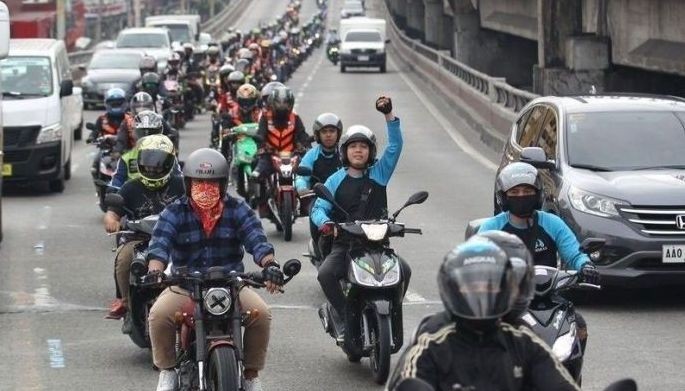MANIILA, Philippines – With poor mass transportation infrastructure in place for the country’s long-suffering commuting public, transport advocates have called on the government to lift the limits on the number of motorcycle taxis (MTs) plying the nation’s roads to provide commuters with a convenient transportation alternative.
In separate statements, CitizenWatch Philippines, Bantay Konsyumer, Kalsada, Kuryente (BK3) and The Passenger Forum argued that removing the limit on MTs will serve the interests of millions of commuting Filipinos while providing livelihood for thousands of qualified drivers and their dependents.
Former Quezon City Rep. and now CitizenWatch Philippines Co-Convenor Atty. Kit Belmonte pointed out that due to the absence of adequate mass transportation systems to serve a growing Filipino population, “millions of commuters are plagued by the daily distress of having to fall in line for hours, squeeze themselves in packed modes of transportation or resort to illegal transport options, just to get home to their families after a hard day’s work.”
The shortage of options, according to the lawyer, has “resulted in the proliferation of illegal habal-habals, which are being patronized by desperate commuters.”
“Because they are unregulated, the drivers of habal-habal do not have proper training and they do not have accident insurance,” Belmonte said.
Removing the limits on motorcycle taxi numbers, said the former legislator, would encourage MT companies to hire these habal-habal, thus providing much-needed livelihood for habal-habal drivers while helping commuters.
“No less than Senator Raffy Tulfo recommended to legalize habal-habal operations, and even asked MC taxi operators to help train habal-habal riders,” noted Belmonte.
On behalf of BK3, Convenor Louie Montemar, in a statement posted online, said: "Nananawagan kami sa mga opisyal sa sektor ng transportasyon na tanggalin na ang limitasyon sa bilang ng mga motorcycle taxi na pinapayagang bumiyahe sa ating bansa. Ito ay upang matiyak ang mas magandang karanasan sa pampublikong pagbibiyahe.”
Montemar stressed that lifting limits was the right policy, noting that “walang limitasyon sa bilang ng motorcycle taxi sa ibang bansa.”
Belmonte explained that other governments do not impose limits on the number of MTs that can operate in their countries as this motivates more players to participate and ensures competition that leads to the better delivery of services for commuters.
The Passenger Forum Convener Primo Morillo, on the other hand, said his group believes “it is about time to do away with the limit for motorcycle taxis as it impedes the potential of MC taxis to serve commuters and provide livelihood for riders.”
“No other than the Philippine Competition Commission recommended the removal of the cap as it will lead to better commuter experience,” added Morillo, who said that the government is already in a position to increase the number of motorcycles-for-hire.
“The removal of limits for operating MTs will truly help commuters, riders, and even the government. We do not have to wait for the passage of the MT law to remove the cap as the TWG can do it now,” Morillo said.
While there are no official government statistics on the number of habal-habal in the country, estimates pegged the number at 200,000 in Metro Manila in 2020, while the proliferation of this mode of transportation in other parts of the country has compeled local government units like Cebu City to create an office to regulate their operations.
The Land Transportation Franchising and Regulatory Board recently urged habal-habal operators, particularly in provinces, to join its pilot study for MTs so they can be regulated and trained in the aspects of proper operations, said its chief Teofilo Guadiz III, in order for them to “operate safely and securely, which will ultimately benefit the riding public.”


